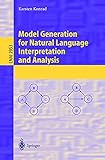Model Generation for Natural Language Interpretation and Analysis [electronic resource] / by Karsten Konrad.
Material type: TextSeries: Lecture Notes in Computer Science ; 2953Publisher: Berlin, Heidelberg : Springer Berlin Heidelberg, 2004Description: XIV, 174 p. online resourceContent type: text Media type: computer Carrier type: online resourceISBN: 9783540246404Subject(s): Computer science | Artificial intelligence | Text processing (Computer science | Translators (Computer programs) | Computer Science | Artificial Intelligence (incl. Robotics) | Computer Science, general | Mathematical Logic and Formal Languages | Document Preparation and Text Processing | Language Translation and LinguisticsAdditional physical formats: Printed edition:: No titleDDC classification: 006.3 LOC classification: Q334-342TJ210.2-211.495Online resources: Click here to access online
TextSeries: Lecture Notes in Computer Science ; 2953Publisher: Berlin, Heidelberg : Springer Berlin Heidelberg, 2004Description: XIV, 174 p. online resourceContent type: text Media type: computer Carrier type: online resourceISBN: 9783540246404Subject(s): Computer science | Artificial intelligence | Text processing (Computer science | Translators (Computer programs) | Computer Science | Artificial Intelligence (incl. Robotics) | Computer Science, general | Mathematical Logic and Formal Languages | Document Preparation and Text Processing | Language Translation and LinguisticsAdditional physical formats: Printed edition:: No titleDDC classification: 006.3 LOC classification: Q334-342TJ210.2-211.495Online resources: Click here to access online  E-BOOKS
E-BOOKS
| Current library | Home library | Call number | Materials specified | URL | Status | Date due | Barcode |
|---|---|---|---|---|---|---|---|
| IMSc Library | IMSc Library | Link to resource | Available | EBK3095 |
1 Motivation -- 1 Motivation -- I Logics -- 2 Model Generation -- 3 Higher-Order Model Generation -- 4 Minimal Model Generation -- II Linguistics -- 5 The Analysis of Definites -- 6 Reciprocity -- 7 Abduction -- 8 Implementation -- 9 Conclusion -- A Some Example Problems -- References and Index.
Mathematical theorem proving has undergone an impressive development during the last two decades, resulting in a variety of powerful systems for applications in mathematical deduction and knowledge processing. Natural language processing has become a topic of outstanding relevance in information technology, mainly due to the explosive growth of the Web, where by far the largest part of information is encoded in natural language documents. This monograph focuses on the development of inference tools tailored to applications in natural language processing by demonstrating how the model generation paradigm can be used as a framework for the support of specific tasks in natural language interpretation and natural language based inference in a natural way. The book appears at a pivotal moment, when much attention is being paid to the task of adding a semantic layer to the Web, and representation and processing of natural language based semantic information pops up as a primary requirement for further technological progress.


There are no comments on this title.